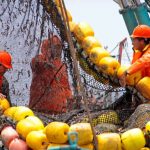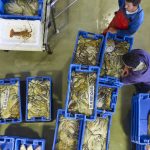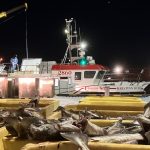The Federation is gearing up for an extremely busy autumn. Although the number of stocks under long term management plans is increasing, theoretically reducing the significance of the December Council, the Commission’s suggestion that all stocks suffering from “data deficiencies” should be subject to a 25% reduction in TAC, ensures that we will have to fight to block this perverse and entirely counterproductive approach.
At the same time, the STECF/ICES report on the EU Cod Management Plan points to the need for serious changes and the first issue to address is what kind of interim arrangements should apply for 2012 given that the present pre-programmed reductions delivers high levels of discards. One of the clear lessons from an analysis of the current Plan is that a tailored approach is required for the Irish Sea.
Whilst ICES advice has now acknowledged the misalignment of the Celtic Sea cod TAC with the fish on the grounds, there is frustration at the slow response from the Commission to requests for a mid-year increase in the TAC. However, it is not difficult to see there is also mounting pressure for the adoption of accompanying technical measures to improve selectivity in the main fisheries which catch amounts of cod. All this will require extensive input from industry organisations, including the NFFO and the RACs if we are to avoid blunt and inappropriate requirements. The Federation will also be playing a significant part in the development of a long term management plan for the demersal fisheries in the Celtic Sea.
Consideration of the management measures that should apply within marine conservation zones and SACs is coming to a head along with the consequences of fleet displacement if the process fails to deliver a balanced and well founded approach. At these can range from additional monitoring to complete closure to fishing vessels, how the issue will be dealt with will be critical.
On the shellfish front, Defra is keen to move forward to address latent capacity through the extension of a rights-based system to the crab and lobster fisheries. This needs a great deal of thinking through to get the right balance between progressive conservation and flexibility for the inshore fleets and the Federation’s Shellfish Committee will be working to strike the right balance.
The consultation exercise on how to address the quota shortage facing some under-10 metre fisheries has turned a spotlight on the wide variety of views even within the inshore sector. Making progress in moving towards a system that delivers viability, stability and flexibility requires a great deal of work and the Federation will be at the heart of those discussions.
The NFFO is involved in four regional advisory councils: North Sea; North West Waters; Pelagic and Long Distance RACs. The RACs have proved themselves as an effective platform for cooperation and collaboration on a regional basis, involving fishing organisations from other member states as well as other stakeholder groups. The workload is heavy but the tangible results can be seen in the emergence of solid advice on long term management plans, cod recovery, discard reduction, CFP reform, maximum sustainable yield and dialogue with ICES etc.
Although the main discussions on CFP reform aren’t expected to take place until after the year end, Defra and the RACs are already working on and refining their positions and it is important that we are centrally involved in both. All parties seem to agree on the urgent need to decentralise decision making within the CFP but there is great uncertainty about the detail of how this will be achieved and what it will look like.
The threat posed by a drift into a concordat with Scotland that lacks transparency but could amount to the biggest change to domestic fisheries policy for years and disenfranchise the English and Northern Irish fleets will continue to be strenuously resisted.








